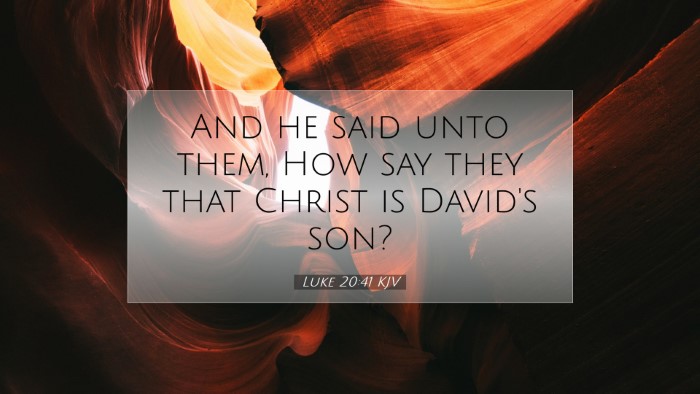Commentary on Luke 20:41
Context of the Passage
The verse Luke 20:41 falls within a larger narrative where Jesus is teaching in the temple amidst an intense dialogue with religious leaders. The context indicates a moment of confrontation, not just from the Pharisees but also from the Sadducees. This dialogue specifies their misunderstanding of the Messiah’s identity and their misinterpretation of the Scriptures.
Verse Analysis
Luke 20:41 (KJV): "And he said unto them, How say they that Christ is David's son?"
The Nature of the Inquiry
Jesus poses a question that addresses the prevailing belief regarding the Messiah as a descendant of David. His inquiry is meant to challenge the limited understanding of His identity among the religious leaders.
Insight from Matthew Henry
Matthew Henry reflects on this verse by emphasizing that the Jews generally recognized the Messiah as a descendant of David, and yet they failed to grasp the dual nature of Christ as both David's son and Lord. Henry notes that the question highlights their ignorance and a failure to understand Psalm 110, where David calls the Messiah 'Lord.' His observation sheds light on the broader Messianic expectations that were prevalent at the time.
Perspective from Albert Barnes
Albert Barnes elaborates on the significance of Jesus' question, recognizing it as a strategic move that invites the leaders to reconsider their assumptions. Barnes notes that by calling the Messiah “David’s son,” they were limiting Him to merely a human lineage, while Jesus, as the Messiah, transcends this status. Barnes urges readers to see that Jesus, being both God and man, fulfills the prophecy in a way that is far beyond their understanding.
Interpretation by Adam Clarke
Adam Clarke underscores the importance of the question in connecting the Jewish expectation of the Messiah with the Old Testament prophecies. He points out that Jesus references the connection between David’s kingship and the heavenly kingdom. Clarke’s exposition suggests that this interaction not only clarifies the identity of Christ but also opens a dialogue about His divine authority over human kingship.
Theological Implications
This passage introduces significant theological discussions regarding the nature of Christ as both human and divine. The implications of recognizing Christ solely as David's son can lead to a skewed understanding of His role as Redeemer and Sovereign.
Christology
The question raises fundamental issues concerning Christology. It necessitates a deeper reflection on how Christ fulfills the dual roles of being the Son of God and the Son of David. This interplay of identities is central to the Christian faith, affirming that while Jesus came in the flesh, He remains fully divine and eternally existent.
Application for Ministry
For pastors and theologians, this text serves as a reminder of the importance of teaching the full scope of Christ’s identity. Engaging with the questions of who Christ is can lead congregants to a more profound understanding of their faith. As leaders, it’s essential to guide others beyond a simplistic view of Christ to embrace the richness of His nature.
Conclusion
In conclusion, Luke 20:41 challenges us to consider how we define Christ in our lives. Jesus invites us to explore the scriptures deeply and recognize the fullness of His identity as both David’s son and the Son of God. The insight from public domain commentaries serves not only to enrich our understanding but also to encourage a wider theological discourse surrounding the person and work of Jesus Christ.


